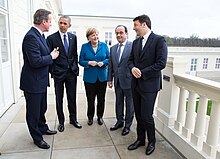Contents

The Quint is an informal decision-making group consisting of the United States and the Big Four of Western Europe (France, Germany, Italy and the United Kingdom).[1][2] All the countries forming it are allies and members of NATO, the OECD and the G7/G20.[3][4][5][6]
The United States, France and the United Kingdom are "nuclear-weapon states", while Germany and Italy are part of the nuclear weapons sharing program.
History
The idea of a trilateral axis on foreign policy issues was proposed by French President Charles de Gaulle to his British and American counterparts (see Fouchet Plan). However, that plan was never implemented. Meetings with that goal took place around 1980 between the foreign ministers of these three countries and West Germany, although they were largely symbolic and led to no real decision.[7] The Quint in its current form seems to have begun as the Contact Group excluding Russia. Nowadays, Quint leaders discuss all major international topics participating in video conferences or meeting one another in various forums such as NATO, the OSCE, the G20[8] and the UN. The Quint meets also at ministerial and experts' level.[9] [10][11] Quint countries along with Russia and China participate together in global discussions as in the Syrian case, they have joint statements and meetings as in the case of Lebanon.[12][13][14]
Current government leaders
See also
References
- ^ "The Quint: Acknowledging the Existence of a Big-Four – US Directoire at the Heart of the European Union's Foreign Policy Decision-Making Process". Academia.edu. Retrieved September 5, 2016.
- ^ Nolan, Janne (December 1, 2010). Global Engagement: Cooperation and Security in the 21st Century. Brookings Institution Press. ISBN 978-0815716723. Retrieved September 5, 2016 – via Google Books.
- ^ Goldstein, Joshua S. (September 15, 2011). Winning the War on War: The Decline of Armed Conflict Worldwide. Penguin. ISBN 9781101549087. Retrieved September 5, 2016 – via Google Books.
- ^ Zaum, Dominik (February 2007). The Sovereignty Paradox: The Norms and Politics of International Statebuilding. OUP Oxford. ISBN 9780199207435.
- ^ "White House Press Briefing, G8 Summit Preview - IIP Digital". Iipdigital.usembassy.gov. Retrieved September 5, 2016.
- ^ "Readout of the President's Meeting with British Prime Minister David Cameron, French President François Hollande, German Chancellor Angela Merkel, and Italian Prime Minister Matteo Renzi | whitehouse.gov". 25 April 2016.
- ^ Supporting the Revolution: America, Democracy, and the End of the Cold War in Poland, 1981--1989. January 1, 2008. ISBN 9780549385165. Retrieved September 5, 2016 – via Google Books.
- ^ international, Ministère des Affaires étrangères et du Développement. "Sommet du G20 : réunion au sommet du Quint". Diplomatie.gouv.fr. Retrieved September 5, 2016.
- ^ Gegout, Catherine (May 8, 2010). European Foreign and Security Policy: States, Power, Institutions, and American Hegemony. University of Toronto Press. ISBN 9781442698727. Retrieved September 5, 2016 – via Google Books.
- ^ "Obama discusses further Syrian intervention with European leaders". CNN. 15 June 2013. Retrieved 13 October 2014.
- ^ "Telefonata Renzi-Obama-Merkel-Cameron-Hollande su Gaza, Ucraina, Libia". Europa Quotidiano. Archived from the original on 19 October 2014. Retrieved 13 October 2014.
- ^ "Lebanon – Ministerial meeting of the International Support Group (Paris, 08.12.17) - France-Diplomatie - Ministère de l'Europe et des Affaires étrangères". Archived from the original on 2018-07-06. Retrieved 2017-12-08.
- ^ "Big power grouping urges Lebanon to uphold policy on steering clear of war | Reuters". Reuters. 10 May 2018.
- ^ "Joint statement of the International Support Group for Lebanon Beirut, Lebanon". Lb.china-embassy.org. Retrieved 2021-11-21.






